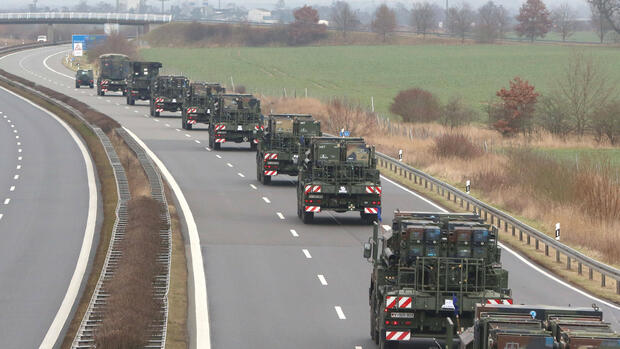NATO and the Bundeswehr doubt that the German road and rail network is prepared for military emergencies.
(Photo: IMAGO/BildFunkMV)
Berlin Transport Minister Volker Wissing (FDP) is taking a decisive step closer to his plan to expand the motorway more quickly. The cabinet is to pass a corresponding draft law on Wednesday and thus make infrastructure projects possible in a hurry.
In addition to a number of rail routes and some waterways, the minister also wants to declare 145 motorway projects to be projects of “outstanding public interest”. Above all, they also served “public safety”, as the legal text justifies the shortened planning and approval procedures.
The justification is particularly important: As with the laws for the construction of liquid gas terminals and wind turbines, it not only enables the projects to be negotiated in court more quickly, but also makes it easier for exceptions to species and nature conservation to be possible in the ongoing proceedings.
Environmentalists reject the plans, but according to relevant case law, preference is possible when it comes to the state’s livelihood, civil protection, security – and national defense.
The FDP and the Greens had been arguing about the planned law for months and turned it into a fundamental issue of climate policy: Should highways be built at all – or only railway lines?
It’s less about the climate and more about military capability
In the background, however, it was about something that nobody likes to talk about out loud: the ability of the military to be mobile quickly and safely with heavy equipment in an emergency. The Bundeswehr and NATO partners are demanding that Germany must function as a hub in Europe so that material and people can travel quickly from West to East in an emergency. However, there have been serious doubts about this since the beginning of the Ukraine war and in view of NATO’s increased operational readiness. Above all, the west-east connections are considered critical.
From the point of view of the Minister of Transport, the law contributes to “increasing the military-logistical performance of the entire network,” as a spokesman explained on request. The draft law states that the road network must “at all times be able to accommodate militarily necessary transports with increased loads”. Up until the 1990s, it was common to plan and build roads with national defense in mind. These guidelines fell into oblivion in the supposedly peaceful decades of this century.
Half of the projects in North Rhine-Westphalia
Now the Ministry of Defense welcomes the planned 145 projects for the highways. Around half of the projects are in North Rhine-Westphalia, where important NATO military logistics units are also stationed. Wissing’s spokesman went on to say that in the case of the rail projects, projects that are of particular interest to the Ministry of Defense would first have to be identified.
The Ministry of Transport is trying to dispel the impression that the infrastructure is no longer sufficient for military emergencies given the dilapidated and closed bridges on the freeways and massive problems in the rail network. “The German transport infrastructure is up to the challenges of military transport and in this respect also meets the requirements of NATO for the hub,” says the ministry. However, this requires the same investments in the network. “This requires constant maintenance and renewal of the stock as well as needs-based expansion and expansion of the German transport network as a whole.”
The Minister of Transport wants to speed up motorway projects – also for national defense, according to his ministry.
(Photo: dpa)
It is unclear whether the projects will all be implemented more quickly. After a long struggle, the SPD, Greens and FDP had agreed on the Acceleration Act. Part of the compromise, however, was that the federal states concerned had to agree. They should give their approval by the end of last week.
However, the countries with transport ministers from the Greens in particular have asked for more time to examine the projects. In addition to Hesse and Baden-Württemberg, this also includes North Rhine-Westphalia.
More: The federal government wants to decide on a speed pact for investments in June

